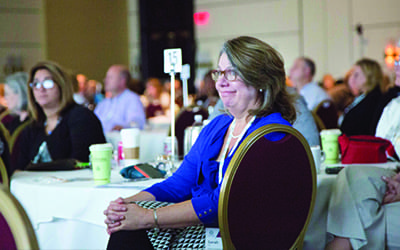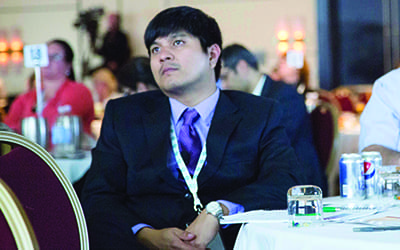
[ad_1]
Glenda Mack, Divisional Vice President of Clinical Operations for Kindred Hospital Rehabilitative Services, introduced Christa Dempsey, Chief Nursing Officer of Press Ganey.
Dempsey began by asking the audience to remember why they began working in the medical field. “We didn’t get into this business for the money or the hours,” said Dempsey. “We need to get back to WHY we all got into this business in the beginning.”
She then quoted the CMO of Press Ganey, Dr. Thomas Lee, regarding quality: “Quality does not mean the elimination of death or perfect compliance with guidelines. Efficiency does not mean the elimination of all spending or even 100% elimination of all wasteful spending. And compassion for patients does not mean the elimination of all pain.”
Next Dempsey told the audience about a word she used to dislike:
Suffering.

But her dislike for the word changed when she became a patient herself, and was reinforced when she became a family member of a critically ill patient. It wasn’t until then that she realized that suffering was the only word to genuinely describe how people in that situation feel.
“It’s fine to say that patients suffer,” Dempsey said. “But what action are we going to take when we know that our patients our suffering?”
Dempsey then highlighted two important insights from Press Ganey:
- Patients value confidence in provider, communication and understanding between patient and provider, and that concerns between the two are aligned.
- Patients recommend providers based on nurse courtesy, team-work and room cleanliness.
.jpg?sfvrsn=0)
Safety and trust seem to be the key. When a room is clean, a patient feels safe from infection. When a team is working together, the patient feels more confident in the care provided. When a nurse is courteous, the patient feels like they can trust and confide in that person.
Dempsey then stressed the most important takeaway she wanted the audience to remember: “The most important thing we do in healthcare is to make our patients feel safe. Nothing is more important than that.”
She added that KEEPING patients safe is a given. Making them FEEL safe is the goal.

Clinicians have five ways to respond when a patient has a problem or a need. As medical professionals, we automatically want to fix the situation, but that’s not always the best FIRST reaction. First, Dempsey recommends, listen. You acknowledge the patient’s suffering by asking questions, listening and using nonverbal cues such as sitting down to calm them. These compassionate actions tell the patient that their time and their problems matter.
According to Dempsey, it takes an average of 56 seconds to make a connection with a patient. Dempsey emphasized how important that minute is to the patient. She charged the audience to go back and ask their co-workers if they can tell one thing about a person they are treating that has nothing to do with why they are being treated. If they can’t, she said, they have work to do.
Dempsey concluded that “100% of the people presenting 100% of the caring behaviors 100% of the time is the only way. That is the compassionate connected care framework.
Please continue to follow the Clinical Impact Symposium 2016 on the Kindred Continuum and on Twitter @KindredHealth.
*Each year the Kindred Clinical Impact Symposium focuses on a topic to enhance clinical practice in the post-acute continuum and to maintain Kindred as a leader in clinical excellence. This eighth symposium focuses on pain management across the continuum. At this week’s symposium, held in Louisville, Kentucky, national speakers discuss these topics broadly, while internal speakers bring it home to Kindred attendees from across the country.
[ad_2]
Source link
